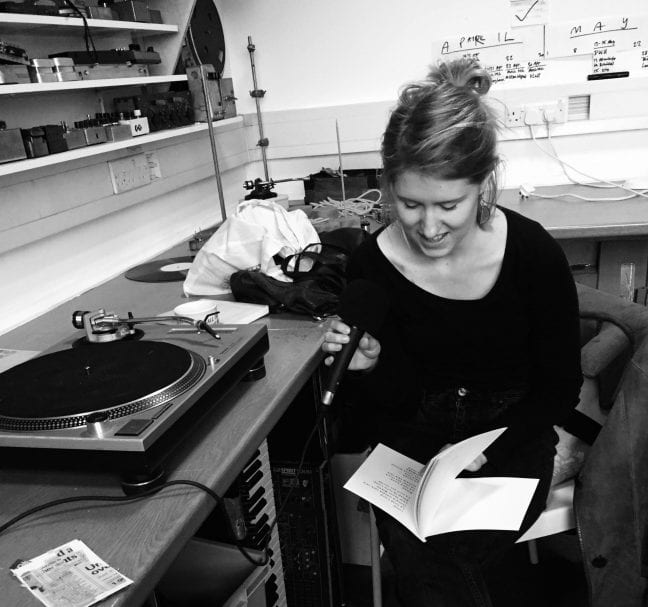This month we talk to Hannah Kemp Welch who grduated from the course in 2009. Hannah has been working as a social practice sound artist, working collaboratively with communities, educators and artists. Hannah has worked with communities across the UK, and shown works at Tate Modern, Middlesbrough Institute of Modern Art, Firstsite Colchester, and Nottingham Contemporary; Hannah is currently the Open House artist in residence at Kettle’s Yard, Cambridge.
DMSA: Where do we find you now?
HKW: I’m currently at Kettle’s Yard, the University of Cambridge’s modern and contemporary art gallery, on a year long residency . I’ve chosen to focus my research on early developments in radio in North Cambridge by the Pye Group, and create radio art works with local community groups, culminating in a day of broadcasts on the local radio station and a display at the gallery opening in March. I also run a music project in Brixton for people with mental health needs, creating new routes into music education, so that people in challenging circumstances can access quality music production spaces, equipment and resources.
DMSA: Three important words that represent you as a creative person
HKW: Social, committed, active.
DMSA: When did you start working with sound and music?
HKW: I’ve been running a community music project since 2013, and working on sound art commissions since a couple of years after completing my MA. I spent a year after university interning in art galleries, and then worked at Tate for 5 years on an action research project. This was great experience; I learnt about the variety of careers in the arts and grew my networks until I started to get commissions. I’m now a freelance artist and work on a variety of residencies, commissions and education projects.
DMSA: In what ways has the DMSA course supported or helped you to develop into who you are today creatively and professionally?
HKW: The DMSA course was my first introduction to sound art, a field I now work in. It offered an entry point, inspiration, and a space to experiment with ideas alongside support and guidance to create work. I learnt a lot of methodology, and was directed to artists and writers whose ideas were very influential in forming my work and values. I’ve stayed in touch Kersten Glandien, who has been very supportive of my work since supervising my dissertation 10 years ago.
DMSA: Can you tell us a bit more about Vanguard, your recent project for Art Gene?
HKW: In November 2018 I was selected for a residency in the Cumbrian town of Barrow-in-Furness, and lived and worked with ten artists to create new works in response to the local area. Barrow is famously where BAE Systems build nuclear submarines. As I’m vice-chair of the London branch of Campaign for Nuclear Disarmament, I felt a pull to make work about this controversial industry, yet was aware that a high percentage of Barrow residents are employed by BAE, so any response must be highly sensitive to the context. My work in Cambridge on the Open House residency programme had put me in touch with amateur radio operators, so I found a local meeting of Furness Amateur Radio Society and asked members questions about submarine communication systems. I interviewed local residents, recorded sounds of the docks, and attempted to listen to submarine transmissions via VLF, compiling my recordings into an audio work. The residency ended with an exhibition at Art Gene, and I made a zine to sit alongside the sound work with images and texts drawn from my research.
https://www.sound-art-hannah.com/vanguard
DMSA: Other plans for the future? projects, events, visions?
HKW: I’m working on a few other projects at the moment, delivering sound art workshops for October Gallery and contributing to a publication on arts education for Tate and TENT Rotterdam. An 8-channel sound work I created with my collaborator Lisa Hall is on display at Sound Reasons festival in New Delhi [and soon to be included in a series of concerts at London College of Communication, UAL. I’m preparing for Hyperlocal Radio , my display at Kettle’s Yard and takeover broadcast on World Radio Day. I’m also delivering lectures at Goldsmiths and for the V&A in February, and hoping to help out with Soundcamp in London on International Dawn Chorus Day in May.
Past this, I’m really keen to develop social practice sound art, seeing a potential to introduce new people to artistic audio production and a need to make sound art accessible and culturally relevant outside of the framework of institutions. I’d love to set up a sound art education studio, or work in a collective of social practice artists. Ideally, I’d like to spend as much time as possible on residencies, learning about new spaces and sharing ideas through sound.










